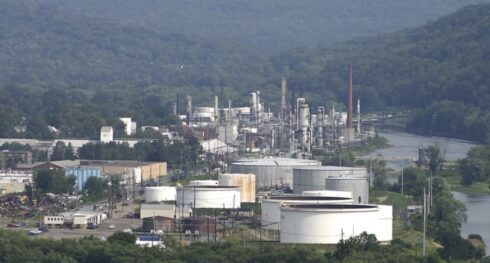Canada’s oil industry, particularly in Alberta, faces significant uncertainty following President-elect Donald Trump’s announcement of a proposed 25% tariff on Canadian goods. The move has sparked widespread concern among Canadian politicians, energy experts, and industry stakeholders, who warn of dire economic consequences for both Canada and the United States.
Canada Alberta’s Oil Industry Under Threat
Alberta, the heart of Canada’s oil and gas production, could be hit hardest by the proposed tariffs. Industry experts, including Dennis McConaghy, a former energy executive, have emphasized the potentially devastating impact on jobs and provincial revenues. “Canada has no choice in this. It has to find an accommodation with Trump,” McConaghy noted.
The proposed levy could force Canada to reduce oil production, threatening thousands of jobs in Alberta. This, in turn, could create ripple effects throughout Canada, as the country’s equalization system relies heavily on wealthier provinces like Alberta to support less affluent regions. Furthermore, the tariff could devalue the Canadian dollar, which is already grappling with domestic economic challenges.
Lisa Baiton, CEO of the Canadian Association of Petroleum Producers, echoed these concerns, emphasizing the critical role of Alberta’s oil sector in sustaining Canada’s economy. “The ramifications of this tariff would be felt across Canada, not just in Alberta,” she warned.
US Energy Security at Risk
The United States, despite being a global leader in oil and gas production, relies heavily on Canadian crude to meet its energy demands. Approximately 40% of the crude processed in US refineries is imported, with Canada being the largest supplier.
The American Fuel and Petrochemical Manufacturers (AFPM) group has urged Trump to exempt oil and gas from any tariffs, warning that such a move could disrupt energy security. “Crude oil is to refineries what flour is to bakeries. It’s our number one feedstock and input cost,” the AFPM stated.
Canadian oil is particularly critical in landlocked regions of the US, such as the Midwest, where refineries are specifically designed to process heavier Canadian blends. Without Canadian imports, the US may need to rely on overseas oil, increasing vulnerability to global market fluctuations and jeopardizing Trump’s promise of energy independence.
Impact on US Consumers and Businesses
Energy analysts predict that Trump’s proposed tariff could significantly increase costs for American consumers and businesses. Patrick De Haan, a Chicago-based gas price expert, estimates that states like Minnesota, Wisconsin, and Michigan could see gas prices rise by up to 75 cents per gallon.
Higher oil prices would not only affect motorists but also escalate costs for industries reliant on fuel, such as airlines and freight companies. These increases could undermine Trump’s campaign promise to lower gasoline prices to under $2 per gallon. Currently, the national average stands at around $3 per gallon, and additional tariffs could further strain household budgets.
The potential rise in fuel costs also conflicts with Trump’s broader goal of enhancing American energy independence. While the tariffs aim to encourage domestic drilling, they risk alienating a key ally and destabilizing the very market Trump seeks to strengthen.
Geopolitical Implications and Negotiation Tactics
Analysts suggest that Trump’s tariff threat may serve as a strategic negotiation tool rather than a definitive policy. In the past, Trump has used similar threats to secure concessions from trade partners. In this case, the tariffs could be a bargaining chip to pressure Canada and Mexico into addressing border security concerns.
Trump has indicated that the levies would remain until Canada and Mexico enhance efforts to curb unlawful migration and drug trafficking into the US. However, the lack of clarity on the final implementation of the tariffs leaves both nations in a precarious position.
As Canada grapples with the economic uncertainty, industry leaders and policymakers continue to advocate for exemptions on oil and gas, emphasizing the interdependence of North America’s energy markets. Whether Trump’s tariff threat materializes or serves as a negotiation ploy remains to be seen, but its potential consequences are already reverberating across Canada’s oil patch.














